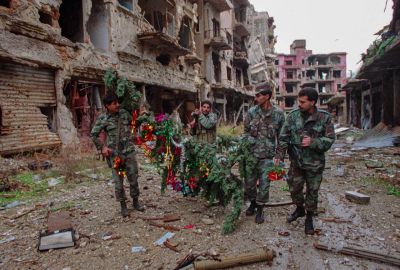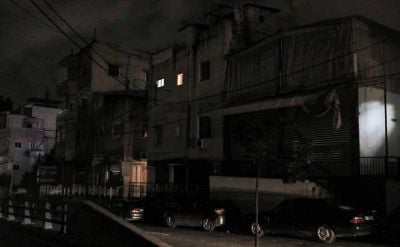A street in Mina. (Credit: Mohamed El Chamaa/L'Orient Today)
TRIPOLI, Lebanon — Christmas decorations still line the cobbled streets in the district of Mina in the northern city of Tripoli. On both sides of the road, bars and cafes cater to customers who enjoy the relatively warm weather of the season. But this New Year’s Eve, most establishments will be closed.
On the surface, it appears the chronic economic and security situation has an influence on the sober atmosphere, with Islamic conservatism playing its own role, but business owners say it is more complicated than that.
Nadine Alidib, the owner of the popular Warch13, told L’Orient Today that: “A lot of the restaurants here close at midnight or a little after. We as a cultural cafe are not going to be open.” She noted that in Tripoli on New Year’s Eve, party goers do not often like to drink so as to avoid accidents: “No one wants to be part of a tragedy I imagine. So it is kind of a risk management situation. I don’t think it’s a security situation.”
But other pub owners point to additional problems as well. In the nearby Mike’s, owner Wahib Zamaraghdis says there is not much momentum to open tonight: “Normally we open for New Year’s but this time around we’re closed because there’s no support from the municipality.”
He noted that the support is usually in the form of a political decision: “No one is stopping us from opening, but you can’t open the bar if you don’t feel comfortable.” Zamaraghdis emphasized that the principal aspect is a lack of awareness that the street which hosts a number of food and beverage businesses is not just “a place to get drunk but also an important sector of the local economy.”
Although not much separates them geographically, and despite being in the same metropolitan area, Tripoli and Mina are divided administratively as each has its own municipality. As a result, Mina has in recent years become a bustling hospitality district not just for the locals but also for people outside the city.
A source at the Mina municipality, who spoke to the L’Orient Today on the condition of anonymity, said, contrary to what some people might think, there were no conditions or restrictions placed on bars on New Year’s Eve.
They specified that none of the business owners had requested a permit to stay open past midnight: “That’s our law, nothing more than 2 a.m.” Rather they point to the fact that the upstairs neighbors of these businesses get annoyed when pubs and cafes stay open past midnight.
The source added that all the municipality could do for the business was to deploy security forces to maintain order: “We let the police protect the area if they want. In the years prior to the thawra [October 2019 uprising], all of them used to have parties and local people used to come.”
Unlike other predominantly Sunni areas in Lebanon such as Saida, alcohol is permissible in Tripoli as a whole. But controversy around alcohol use is not new. In 2014, the mayor of Tripoli banned alcohol advertisements.
This drew the ire of some politicians such as MP Sami Gemayel, who called on the ban to be reversed, the decision also sparked social media buzz on Twitter with the hashtag #Tripoli_Loves_Beer.
This latest controversy has a deeper root, reflecting a cultural swaying back and forth between conservatism and liberalism that started after the Second World War.
According to Raphaël Lefèvre, a professor at Aarhus University in Denmark, in the 1950s and 60s, “the city and the upper-middle-class neighborhood of New Tripoli in particular had become characterized by a growing liberalization of social mores … it was also a period during which myriad establishments selling alcohol and featuring gambling games opened their doors and thrived in Tripoli.”
He noted that the city hosted Lebanon’s first casino, Cheval Blanc, before Casino Du Liban, as well as “several cabarets, restaurants where wine was served, nightclubs and bars.”
But all this changed in the 1980s. In her 2022 book Sunni City, Tine Gade of the Norwegian Institute of International Affairs explains the Tawhid party, who wanted to establish an Islamic Emirate in Tripoli, began to phase out alcohol by closing establishments that served it, or through roadblocks to prevent its distribution inside the city: “People who smelled of alcohol when returning from Christian areas were sometimes beaten.”
This trend has been reversed since the end of Lebanon’s 1975-90 Civil War after the Tawhid movement was marginalized but the religious mores were maintained.
However, Tripoli faces competition from nearby touristic areas such as Batroun. Wahih, owner of Mike’s bar says “Ever since Batroun has been around, business has been slow, they have the political support to run their businesses, and we don’t.”

